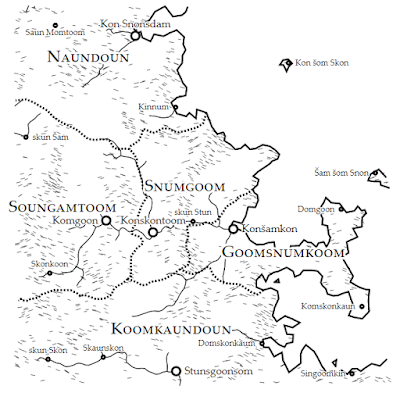And almost always, maps. Behind the front cover of one of these novels, you were sure to find a black and white hand-drawn map of the story's setting. These books taught me that a good fantasy story needs a good map. The maps hooked readers, showing unknown worlds waiting to be filled by the novel. Sometimes the maps themselves were better than the following story, even!
It was this exact sentiment that led creative coder Martin O'Leary to create his Fantasy Map Generator. "I always had a fascination with these imagined worlds," he writes,"Which were often much more interesting than whatever luke-warm sub-Tolkien tale they were attached to."
The generator can produce random, finished maps at the click of a button. Many of maps produced this can be found on O'Leary's Uncharted Atlas twitter feed. If use the generator, though, and you want more control over what your fantasy looks like, you have options. You can shape your bodies of land through the "add slope", "add cone", "add inverted cone", and "add 5 blobs" options. You can exercise further control over your map by changing sea level and dictating erosion rates. In this way, the Fantasy Map Generator can produce a map that fits your story.
The site also give you the option to add cities and even generates names for the places on your map. This part of the map-generating process provides the greatest strength and greatest shortcoming of the generator. On one hand, the randomly generated names have a consistent feel, thus avoiding the laughable Aerith and Bob trope. On the other hand, the names are distributed in a restrictive way. Every city placed on the map is named, but the generator will only generate 5 area names, which always coincide with the first 5 cities placed on the map. Writers who want more than 5 areas or who want names for mountain ranges, islands, rivers, peninsulas, or other landforms may want to run the generator multiple times, use O'Leary's Name Generator, or even just come up with names themselves.
Naturally, such a generator should not be a crutch. As a writing tool, Martin O'Leary's Fantasy Map Generator is a good place to start, but the nature of the world your randomly generated map depicts is up to you. O'Leary even invites courageous compauthors to take a look at his code and try modifying the generator to their liking. Personally, I'm tempted to try and rectify the limitations mentioned above (stay tuned and see if anything comes of it).
So if you are the kind of writer who loves nostalgia-inducing fantasy paperbacks, is looking for inspiration for their own fantasy novel, or just loves playing with these sort of creative tools, consider spending a few hours generating fantasy maps. Between this, Microscope, and Who The Fuck Is My DnD Character, there is no shortage of great tools for constructing a great, fun, high-fantasy narrative.
Go forth and write!







No comments:
Post a Comment